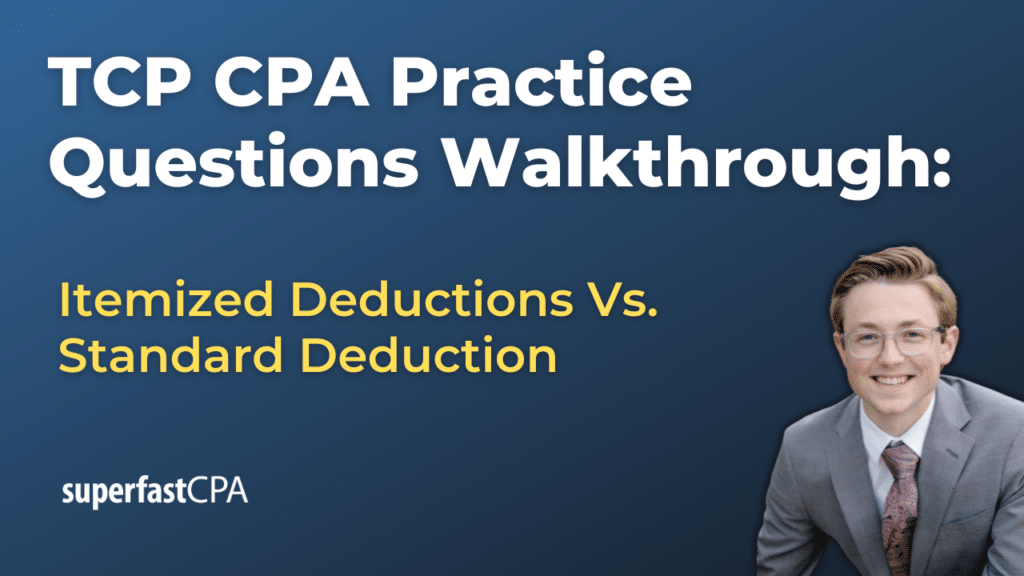In this video, we walk through 5 TCP practice questions teaching about taking itemized deductions vs. the standard deduction for tax planning. These questions are from TCP content area 1 on the AICPA CPA exam blueprints: Tax Compliance and Planning for Individuals and Personal Financial Planning.
The best way to use this video is to pause each time we get to a new question in the video, and then make your own attempt at the question before watching us go through it.
Also be sure to watch one of our free webinars on the 6 “key ingredients” to an extremely effective & efficient CPA study process here…
Itemized Deductions Vs. The Standard Deduction
Deciding whether to itemize deductions or take the standard deduction is a critical aspect of tax planning, as it can significantly affect your tax liability. Here’s a detailed overview of how to make this decision, particularly focusing on medical expenses, charitable contributions, and SALT tax deductions as part of the itemized deductions.
Each taxpayer has the option to take the standard deduction or itemize deductions on their tax return. The standard deduction amount varies depending on filing status (e.g., single, married filing jointly) and is adjusted annually for inflation. It offers a flat reduction in taxable income, simplifying the filing process and not requiring detailed record-keeping or receipts.
Itemized deductions, on the other hand, require taxpayers to individually list eligible expenses that the IRS allows to be deducted from adjusted gross income (AGI) to reduce taxable income. Deciding to itemize is typically based on whether the total of all itemizable deductions exceeds the standard deduction.
Key Categories of Itemized Deductions
Medical Expenses
- What’s deductible: Deductible medical expenses include payments for diagnosis, cure, mitigation, treatment, or prevention of disease, and payments for treatments affecting any structure or function of the body. Expenses can include payments to doctors, dentists, surgeons, and other medical practitioners, as well as costs for hospital stays, nursing care, and some medical equipment.
- Deduction threshold: Only the amount of total medical and dental expenses that exceed 7.5% of your AGI can be deducted. For example, if your AGI is $100,000, you can deduct medical expenses that exceed $7,500.
Charitable Contributions
- What’s deductible: Monetary and property donations to qualified charitable organizations are deductible. The specific rules depend on the type of donation:
- Cash donations are straightforward and are generally deductible up to 60% of AGI.
- Property donations, like clothing, vehicles, or stocks, are generally deductible at their fair market value if the items have been held for more than one year and have an overall limit of 50% of AGI.
- Special considerations: Donations of property held for less than one year are deductible only up to the cost basis, which is generally the amount paid for the item.
- Any amount’s over the contribution limits are carried forward for up to 5 years to be used in future years, under similar restrictions.
State and Local Taxes (SALT)
- What’s deductible: Deductions can be taken for state and local property taxes, and either state and local income taxes or sales taxes.
- Deduction cap: The total SALT deduction is capped at $10,000 ($5,000 if married filing separately), regardless of the actual amount paid.
Decision-Making Process
To decide whether to itemize deductions, compare the sum of all potential itemized deductions (medical expenses over the 7.5% AGI threshold, full charitable contributions as allowable, and SALT taxes up to the $10,000 cap) to the standard deduction for your filing status. If the total itemized deductions are higher, you should itemize to reduce your taxable income further and thus lower your tax liability.













